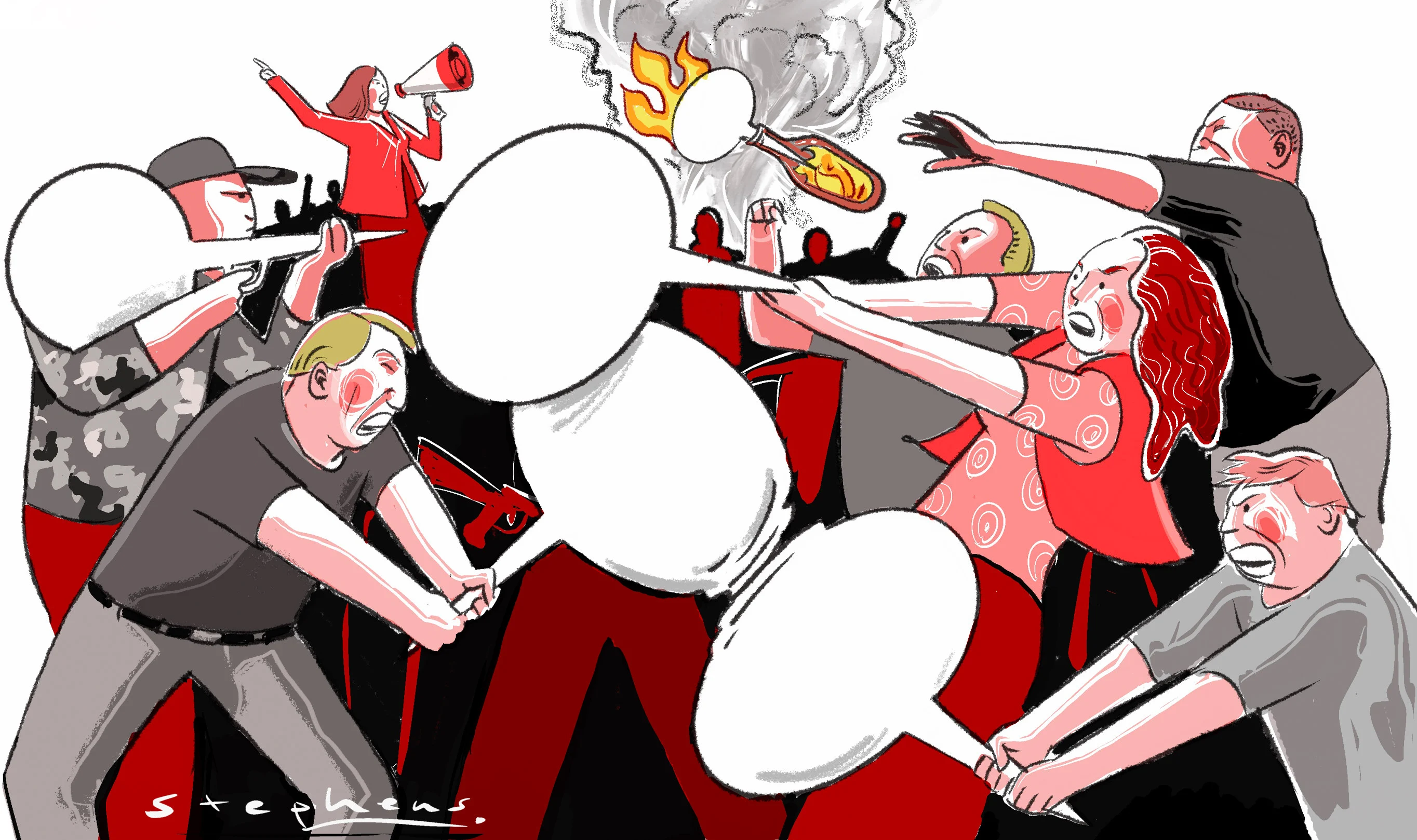By Thomas O. Falk
Copyright scmp

Politics has always been adversarial. In a healthy democracy, that contest is bounded by rules: elections settle disputes, opponents are rivals not enemies, and losing an argument is not the same as losing one’s country. Break those bonds, and the descent from rhetoric to violence is swift, and we are beginning to see the consequences.
Political language in the United States has grown increasingly toxic. Partisans no longer accuse one another of being wrong, but of being enemies and traitors. That language, repeated by politicians and amplified by social media, creates permission structures. It tells people the other side is not fellow citizens but indeed an existential threat. Once that logic takes hold, violence is not a rupture from politics. It is the natural next step.
The killing last week of Charlie Kirk crystallises this. Gunned down while addressing a university audience, Kirk was not the first victim of political violence, but he was the most visible. Regardless of his politics, his assassination should have been a moment of collective recoil.
A society that knows its limits would have drawn a red line: disagreement is not grounds for execution. Instead, it became a pretext for mobilisation.
Fox News host Jesse Watters opined, “they are at war with us”. Influential former Trump chief strategist Steve Bannon told his audience Kirk was a casualty of war. Elon Musk called the left “the party of murder”. US President Donald Trump again failed the moment when his address to the nation echoed these preposterous sentiments.
What should have marked a turning point became a recruitment campaign, if not a direct incitement to violence or at the very least the acceptance of future violence.
Two truths follow from this. First, political violence in the US is structural. From the attempted kidnapping of Michigan Governor Gretchen Whitmer to the assassination attempts on Trump to the murder of American lawmaker Melissa Hortman and her husband, these moments aren’t an aberration but a new, sad normal. A culture of grievance, conspiracy and guns ensures each year brings fresh plots, fresh attempts and fresh martyrs.
Second: rhetoric matters. Language is not neutral. When politicians and influencers describe elections as stolen, when they tell supporters the nation is under siege or that the enemy is Marxist or tyrannical, people will act. When they declare “we are at war”, it should surprise no one when the war comes.
What makes the US uniquely combustible is not just its rhetoric but its armament. Civilian-owned firearms number in the hundreds of millions. There are more guns than people in a country where the line between speech and action is paper-thin.
The US may be the extreme, but the patterns it illustrates – rhetoric as a prelude to violence – are emerging in Britain too.
Years of instability after the disastrous Brexit vote have left Britons weary of political incompetence. UK Prime Minister Keir Starmer was meant to provide competence and calm. Instead, his government is seen as managerial at best, evasive at worst. Immigration, a divisive issue, remains unresolved. Bad-faith actors are increasingly stepping into the vacuum to stoke the flames.
The “Unite the Kingdom” rally – perhaps the largest far-right demonstration in Britain in decades – marked the latest example of political uprising disguised as protest. More than 100,000 people gathered in London, some of whom would later violently attack the police.
What made the situation more worrying was the appearance of the same forces that have contributed to political violence in the US, namely Elon Musk. He addressed the demonstration by video link and called for the dissolution of the British Parliament and the removal of Starmer’s government, while telling the crowd that “violence is coming to you” and “you either fight back or you die”.
It hardly gets more direct than this. If the world’s richest man incites violence, many will listen and act.
The government’s condemnation of Musk’s words and of the police attacks fell short of what is needed to regain control of the situation.
Meanwhile, violence is already being normalised. Seven in 10 Britons fear political violence, according to a recent survey. Misinformation and disinformation compound the danger, spreading conspiracies and framing intimidation as legitimate protest. The consequences have already been lethal. In 2016, UK Labour Party lawmaker Jo Cox was murdered by a man steeped in extremist propaganda.
Since then, harassment and threats have become so routine that the government is allocating an additional £31 million (US$36.5 million) to protect lawmakers. Such measures may protect individuals, but they also signal something darker: when democracy requires panic buttons and bodyguards as standard, the line between vigorous politics and violence is already perilously blurred.
What is to be done? First: restore the boundaries of language. Leaders must refuse the rhetoric of existential war. Stop calling opponents enemies. Stop framing politics as survival. In free societies, words shape conduct.
Second, prosecute relentlessly. Political violence thrives when justice is slow, hesitant or partial. Arrests, trials and sentences must be swift and visible – not as theatre, but as deterrence.
Lastly, address grievances such as economic stagnation and concerns about immigration, which provide the conditions in which extremism thrives.
The US shows how contempt becomes culture and culture becomes carnage. Britain is not there yet. But if some – as the quote goes – “just want to see the world burn”, the rest of us must not turn indifferent or complicit but lead by example and champion the principle that politics should be fought with words, not weapons.



